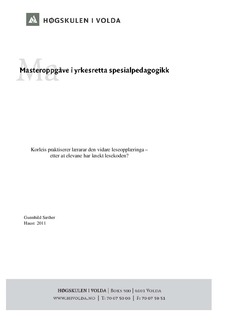| dc.contributor.author | Sæther, Gunnhild | |
| dc.date.accessioned | 2012-02-21T14:15:54Z | |
| dc.date.available | 2012-02-21T14:15:54Z | |
| dc.date.issued | 2012 | |
| dc.identifier.uri | http://hdl.handle.net/11250/153884 | |
| dc.description.abstract | Summary
The topic question in this thesis is: how do teachers practise further reading training - after the students have broken the reading code? My goal was to increase my knowledge about the phenomenon of reading and thus to gain a greater insight into how teachers engage in further reading training. The theme is central in today's society, and I saw a need to illuminate the subject of reading education in a wider context, and hope that others will benefit from the findings of the investigation. Explaining the concept of reading and literacy has been challenging. Observing relevant theories and research, I needed to make sense of these. I have looked at models that can be used to gain insight into what indeed literacy is. I have also looked at motivation, which is an important factor in learning. Furthermore, I have studied national and international reading surveys. To answer the research question, I have used a qualitative method. I have based my outline on questions from PIRLS, and adapted these to my survey. I have conducted ten individual interviews in two municipalities. I've used tapes and transcribed these. I have then structured the data into themes and used the arrays as the basis for the analysis. It was found that the respondents gave the same answers. Despite this I have a certain width in the data base. The informants work at different schools. They have different backgrounds and knowledge. Results show that respondents have a good understanding of the theme. They have experienced both success and failure in the field. It has been a challenge to pick out items and present them; some I have cast aside. It has to be that way to refine the material. I have chosen to focus the discussion on several topics. I find it valuable both for research and for others wishing to study the various issues in the field and do further research on some of the findings. My informants have gained a greater awareness around further reading education as a concept. I see that they work with the phenomenon in different ways. Reading is largely seen as an individual skill, and I question the division of responsibility. The informants also have a low attitude of adapted training. Some work for the notion of time pressure and a great curriculum. The results of my survey correspond with previous research in this field. | en |
| dc.description.abstract | Samandrag
Problemstillinga i denne masteroppgåva er: Korleis praktiserer lærarar den vidare leseopplæringa – etter at elevane har knekt lesekoden? Målsettinga mi var å auke kunnskapen min om fenomenet lesing og få ei større innsikt i korleis lærarar driv den vidare leseopplæringa. Temaet er sentralt i dagens samfunn, og eg såg eit behov for å belyse temaet og sette den vidare leseopplæringa inn i ein større samanheng, og håper at andre vil ha nytte av funna i granskinga. Å forklare omgrepa lesing og literacy har vore utfordrande. Gjennom relevante teoriar og forsking har eg freista å sette ord på dei. Eg har sett nærare på modeller som kan nyttast for å skaffe seg innsikt i kva leseferdigheit er. Dei kan også brukast som verktøy i arbeidet med å utvikle leseferdigheit. Eg har også sett på motivasjon, som er ein viktig faktor i all læring. Vidare har eg studert nasjonale og internasjonale leseundersøkingar. For å svare på problemstillinga har eg nytta ein kvalitativ metode. Eg har tatt utgangspunkt i spørsmål frå Pirls, og tilpassa desse til undersøkinga mi. Eg har gjennomført ti enkeltintervju i to kommunar. Eg har brukt lydband og transkribert intervjua. Deretter har eg strukturert datagrunnlaget inn i tema og har brukt matriser som grunnlag for analysen. Det viste seg at informantane hadde like svar. Til tross for det meiner eg at eg har ei viss breidde i datagrunnlaget. Informantane arbeider ved ulike skular, dei har ulik bakgrunn og røynsle. Resultata viser at informantane har god innsikt i tema. Dei har røynsle med å lukkast og mislukkast på feltet. Det har vore eit utfordring å plukke ut element og presentert desse, og noko har eg valt vekk. Slik må det vere for å avgrense materialet. Eg har i drøftinga valt å fokusere på fleire tema, fordi eg finn det av verdi både av omsyn til eiga forsking og for andre, som ønskjer å setje seg inn i ulike problemstillingar på feltet og forske vidare på enkelte funn. Hos informantane mine har den vidare leseopplæringa som omgrep fått gjennomslag. Eg ser at dei jobbar med fenomenet på ulikt vis. Lesing blir for ein stor grad sett på som ei individuell ferdigheit. Eg stiller spørsmål om ansvarsfordelinga. Informantane har også ei smal haldning til tilpassa opplæring. Nokre jobbar etter førestillinga om tidspress og eit stort pensum. Resultata frå granskinga mi samsvarer med tidligare forsking på feltet. | no_NO |
| dc.language.iso | nno | no_NO |
| dc.publisher | Høgskulen i Volda | |
| dc.subject | leseopplæring | no_NO |
| dc.subject | grunnskolen | no_NO |
| dc.subject | lesekunne | no_NO |
| dc.subject | leseferdighet | nb_NO |
| dc.subject | læringspsykologi | no_NO |
| dc.subject | nasjonale prøver | no_NO |
| dc.subject | internasjonale leseundersøkingar | no_NO |
| dc.subject.ddc | 372.45 | |
| dc.subject.ddc | 372.4049 | |
| dc.subject.ddc | 371.9144 | |
| dc.title | Korleis praktiserer lærarar den vidare leseopplæringa - etter at elevane har knekt lesekoden? | no_NO |
| dc.type | Master thesis | no_NO |
| dc.subject.nsi | VDP::Social science: 200::Education: 280::Special education: 282 | no_NO |
| dc.subject.nsi | VDP::Social science: 200::Education: 280::Subject didactics: 283 | no_NO |
| dc.source.pagenumber | 92 | no_NO |
